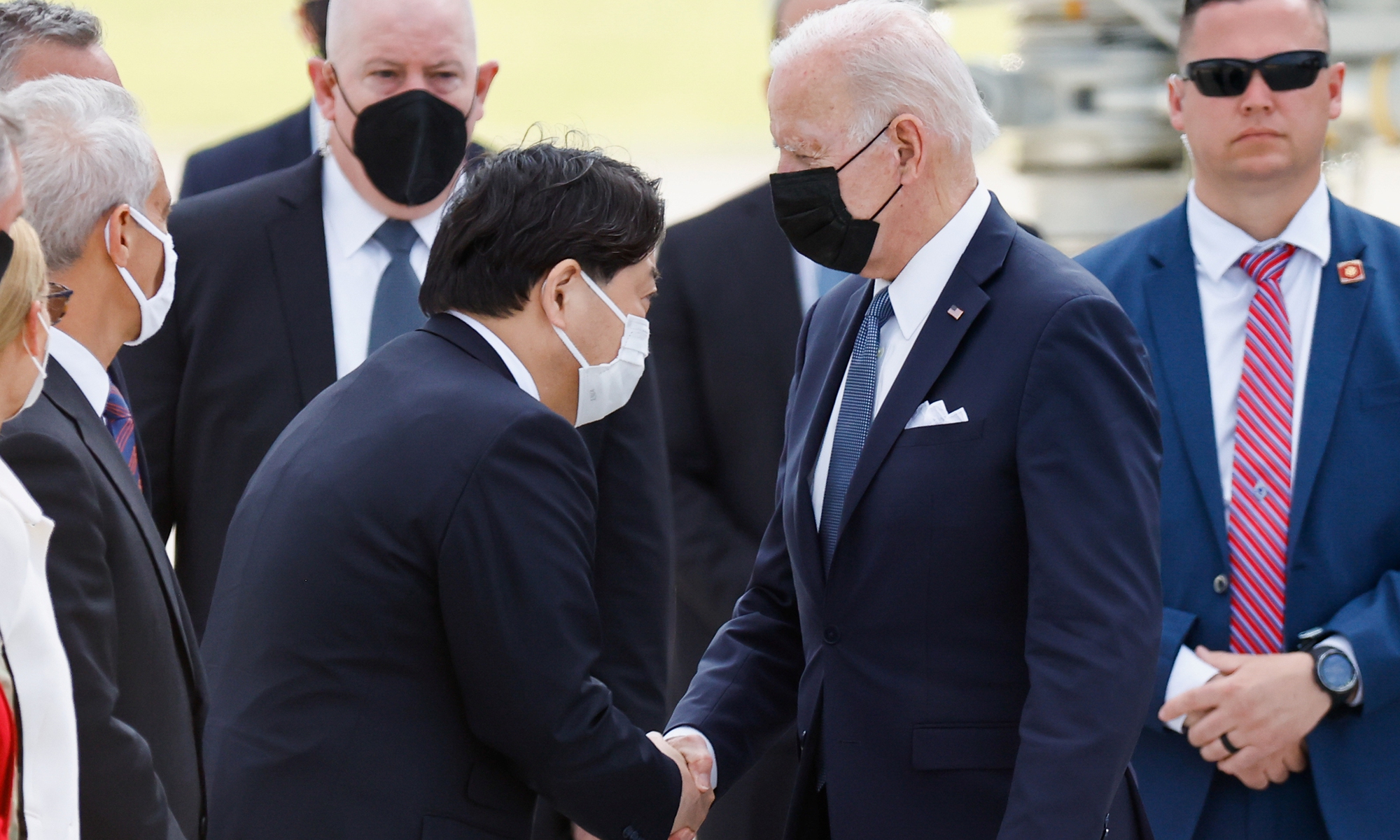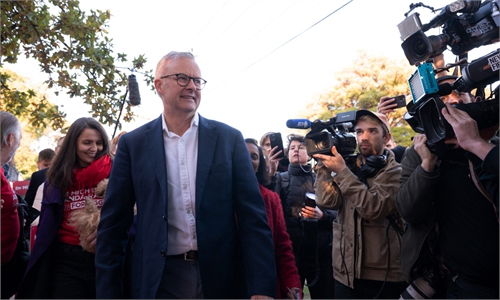
US President Joe Biden shakes hands with Japanese Foreign Minister Yoshimasa Hayashi upon his arrival at Yokota US Air Force Base in Fussa, on the outskirts of Tokyo, Japan on May 22, 2022. Photo: VCG
The antagonism against China marking US President Joe Biden's Asia trip is expected to reach a climax during his visit to Japan, as the latter has gradually descended into becoming a US vassal in containing China and hopes to shore up its own regional influence, observers said, as Biden arrived in Japan on Sunday.
In Japan, Biden will reportedly launch the Indo-Pacific Economic Framework (IPEF), a plan the US aims to counter China, and it is also predicted that China-related topics will dominate both bilateral talks between Biden and Japanese Prime Minister Fumio Kishida and the following Quad summit.
But experts believe that this trip, which began with great fanfare, will end in anticlimax, as the IPEF, even before it is formally launched, has received widespread criticism due to its lack of concrete benefits for the region, and has also met with a lukewarm response from Southeast Asian countries, whom the US President is eager to rope in. Also, the Quad summit is unlikely to yield any harsh rhetoric against China, as a split between Quad members India and the US runs deep on certain international issues. Moreover, if a joint statement between Washington and Tokyo touches on any issues concern China's core interests, it will meet with a fierce and solemn response from China.
Biden arrived in Japan on Sunday afternoon, starting the second half of his Asia trip after South Korea. In Tokyo, Biden will call on Emperor Naruhito on Monday before talks with Prime Minister Fumio Kishida.
On the same day, Biden will also launch IPEF, a program the US hopes to bring regional countries closer together via common standards in areas including supply-chain resilience, clean energy, infrastructure and digital trade, Reuters reported on Sunday.
Commenting on the plan, US Trade Representative Katherine Tai said during an interview on Friday that above all else it would demonstrate "the US' abiding commitment as a partner to the countries in this region" as Washington seeks to keep growing Chinese influence in check.
But apart from US allies, only a handful of Southeast Asian countries, including Singapore, the Philippines, Vietnam and Malaysia have shown any willingness to join. Reuters quoted a Japanese Finance Ministry official as saying that many Southeast Asian countries will not join IPEF because of the lack of any practical incentives such as tariff reductions.
When meeting with Pakistani Foreign Minister Bilawal Bhutto Zardari on Sunday, Chinese State Councilor and Foreign Minister Wang Yi said that there should be big questions asked about the IPEF. Wang questioned what purpose the IPEF served, and said China, like many other regional countries, like to see proposals that strengthen regional cooperation, but oppose plans that stir up antagonism.
Wang listed a number of criteria for seeing through the real purpose of this new plan, namely promoting free trade instead of promoting trade protectionism; helping global economic recovery instead of wreaking havoc on supply chains; and stimulating openness and cooperation, not creating geopolitical antagonism. He added that anyone attempting to isolate China by pushing certain frameworks will eventually find itself being isolated.
The IPEF will not have a large impact on China, Liu Jiangyong, vice dean of the Institute of Modern International Relations at Tsinghua University, told the Global Times, explaining that the Asia-Pacific region has multiple regional cooperation systems coexisting, and the IPEF can neither replace the existing cooperation mechanisms such as RCEP and APEC, nor stop the original regional economic cooperation. He noted that the plan came into being because the US wants to plug the loophole of its Indo-Pacific policy, after realizing that it lacks economic incentives to pull regional countries closer. But this kind of plan is highly exclusive and ideological, and goes against the rules of economic development and the trend of globalization.
Peak of antagonism
Media reported that Biden and Kishida are expected to discuss Japan's plans to expand its military capabilities and reach in response to China's growing might. On the second leg of his first Asia trip as president, Biden is to meet with leaders of Japan, India and Australia, the Quad, another cornerstone of his strategy to push back against China's expanding influence.
As Biden arrived, Tokyo saw protests with demonstrators holding banners saying "Oppose Quad, oppose Biden-Kishida talks." Ikeda, the organizer of the protest, told the Global Times that the talks, centered on pushing the construction of US military bases in Japan and deployment of Japan's self-defense forces, will surely turn Japan into a "battlefield."
He said that true diplomacy should reflect on what should be done to avoid war, but now Japan is following the US to push military deployment on the premise of war, which is a questionable starting point. Ikeda said Japan has lost true diplomacy.
Washington has successfully tied Japan to its chariot to counter China, Lü Xiang, research fellow at the Chinese Academy of Social Sciences, told the Global Times.
In what observers said was a "move to show its fidelity to Biden", Kishida on Saturday slammed China's suspected test drilling in the disputed East China Sea as "unacceptable."
Japanese authorities on Sunday said they had discovered that the Liaoning aircraft carrier group, which has been holding exercises there since the start of the month, sailed through the Miyako Strait and returned to the East China Sea.
Ever since Liaoning carried out the exercise, Japanese media has been constantly hyping the activities, a move explained by military experts as an excuse for Japan to develop weapons such as aircraft carriers and submarines, and also to cover up the US and Japan's constant patrols and drilling near China's waters.
The US and Japan share a similar stance on global and East Asian affairs, in which countering China is a mutually important goal for the two, an anonymous expert from the Institute of International Relations at the China Foreign Affairs University in Beijing, told the Global Times.
China stands in the way of Japan in its bid to shore up its regional and global influence, thus Tokyo wants to rely on US power to achieve that goal, while the US needs Japan to serve as its pawn to provoke China on key issues such as the Taiwan question, said the expert, who predicted that it is possible that a joint statement between the two will equate the Taiwan question to the Ukraine crisis.
Japan's Kyodo News reported last week that the two countries will once again highlight peace and stability for Taiwan, while Kishida seeks to share with Biden a concern that what is happening in Ukraine could occur in East Asia as well. Such worries are also expected to be reflected in their joint statement.
In a phone call with US National Security Advisor Jake Sullivan on Wednesday, China's senior diplomat Yang Jiechi noted the US' recent deeds on the Taiwan question are opposite to its words. If the US persists in playing the "Taiwan card" and goes further down the wrong path, China will take firm actions to safeguard its sovereignty and security interests, and the US can count on China to keep its promise.
Lü also predicted Biden's Asia trip is unlikely to live up to its expectations. For one, countries in this region are sitting on the fence as there is a possibility that there may be another Republican president soon, spelling an end to their seemingly close relationship.
"Many of the US' allies are sick of its flip-flopping foreign policies, and are more sensitive to its domestic political turmoil. So those countries should be more careful in listening to what the US says, and more importantly, whether what it does matches its words," said Lü.

